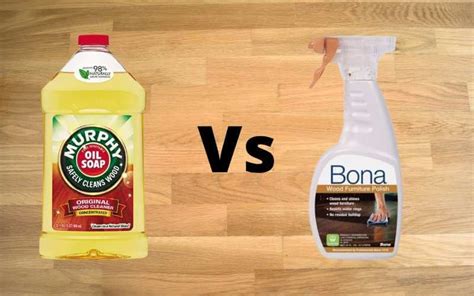When it comes to cleaning your floors, you want to ensure you use the best products for the job. Two popular choices are Bona and Murphy’s Oil Soap, each with its unique strengths and weaknesses. This comprehensive comparison will help you determine which option is right for your flooring needs.

Key Differences
| Feature | Bona | Murphy’s Oil Soap |
|---|---|---|
| Ingredients | Water-based, low VOCs | Oil-based, contains VOCs |
| Purpose | Cleans and protects polyurethane-finished floors | Cleans and nourishes unfinished, oiled, and waxed floors |
| Finish | Leaves a clear, glossy finish | Leaves a matte, satin finish |
| Drying time | Dries quickly, within 15-20 minutes | Dries slower, takes several hours |
| Scent | Pleasant, citrus aroma | Strong, pine-like odor |
| Price | Generally more expensive | Generally less expensive |
Bona
Pros:
- Developed specifically for polyurethane-finished floors, providing optimal protection and cleaning.
- Water-based formula is low in VOCs, making it safer for families and the environment.
- Leaves a durable, glossy finish that resists scratches and wear.
- Easy to apply with a microfiber mop or cloth.
Cons:
- Not suitable for unfinished or oiled floors.
- More expensive than Murphy’s Oil Soap.
Murphy’s Oil Soap
Pros:
- Versatile formula works well on a wide range of floor types, including unfinished, oiled, and waxed surfaces.
- Nourishes and conditions wood floors, leaving them looking rich and vibrant.
- Oil-based formula provides a natural, matte finish.
- Budget-friendly option.
Cons:
- Contains VOCs, which can emit a strong odor and may be harmful to indoor air quality.
- Can leave a greasy residue on some floors.
- Requires longer drying time compared to Bona.
Which One Should You Choose?
The best choice between Bona and Murphy’s Oil Soap depends on the type of flooring you have and your cleaning preferences.
Choose Bona if:
- You have polyurethane-finished floors.
- You prioritize environmental sustainability.
- You prefer a quick drying time.
- You want a clear, glossy finish.
Choose Murphy’s Oil Soap if:
- You have unfinished, oiled, or waxed floors.
- You want a budget-friendly option.
- You prefer a natural, matte finish.
- You are not concerned about VOC emissions.
Effective Strategies for Floor Cleaning
- Use a microfiber mop or cloth for optimal cleaning efficiency.
- Avoid using excessive soap, as it can leave a residue.
- Rinse your mop or cloth thoroughly in clean water after each use.
- Test the product on an inconspicuous area before applying it to the entire surface.
- Allow ample time for the floor to dry completely before walking on it.
Common Mistakes to Avoid
- Using a broom or vacuum cleaner can scratch or damage delicate flooring.
- Over-cleaning can wear down the finish of your floors.
- Using harsh chemicals or abrasive cleaners can damage your flooring and emit harmful fumes.
- Mixing different cleaning products can create toxic reactions.
How to Use Bona and Murphy’s Oil Soap
- Prepare the floor: Sweep or vacuum the floor to remove loose dirt and debris.
- Dilute the solution: Follow the manufacturer’s instructions to dilute the soap in water.
- Apply the solution: Use a microfiber mop or cloth to apply the solution to the floor in even strokes.
- Rinse the mop or cloth: Rinse the mop or cloth thoroughly in clean water after each section.
- Let the floor dry: Allow the floor to dry completely before walking on it.
Beyond Cleaning: Innovative Applications
Bona
- Use as a wood cleaner for furniture and cabinets.
- Dilute with water and use as a window cleaner.
Murphy’s Oil Soap
- Mix with water and use as a natural pesticide spray for plants.
- Dilute with water and use as a leather cleaner and conditioner.
